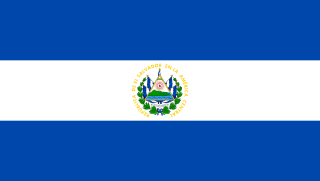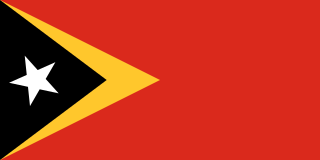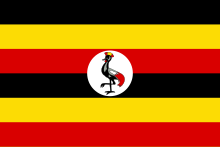
Afghanistan first competed at the Paralympic Games during the 1996 Summer Paralympics in Atlanta, where it was represented by cyclists Gul Afzal and Zabet Khan.

The Philippines competed at the 2000 Summer Paralympics in Sydney. The country was represented by two athletes: Andres Lubin in the men's javelin, and Adeline Dumapong in women's powerlifting, in the up to 82.5 kg category.

Uganda competed at the inaugural Winter Paralympic Games in 1976 in Örnsköldsvik, Sweden.

Uganda competed at the 1980 Winter Paralympics in Geilo, Norway.
Tofiri Kibuuka is an Ugandan-born Norwegian athlete. He has participated in both the Winter Paralympic Games, in cross-country skiing and in the Summer Paralympic Games, in mid- and long-distance running. Active from 1976 to 2000, he won five Paralympic silver medals, and one bronze.

Uganda sent a delegation to compete at the 1976 Summer Paralympics in Toronto, Ontario, Canada. The country entered only one athlete, who competed in athletics. He did not win a medal.
David Bruce Warner is a South African alpine skier. He is the only person ever to have represented South Africa at the Winter Paralympic Games, and he is one of only two Africans to have competed at the Games to date.

South Africa competed at the 2010 Winter Paralympics in Vancouver, British Columbia, Canada. The appearance marked the nation's fourth appearance at a Winter Paralympics since its debut at the 1998 Games; to athlete has won any medals. As with the previous four occasions, the country's only representative at the 2010 Paralympics was alpine skier Bruce Warner. He acted as the flag bearer in the Parade of Nations during the opening ceremony. Warner competed in four standing skiing events, but did not place on the medal podiums.

Lesotho made its Paralympic Games début at the 2000 Summer Paralympics in Sydney. It has competed in every edition of the Summer Paralympics since then, but never in the Winter Paralympics. Lesotho has never won a medal at the Paralympic Games.

The United Arab Emirates started actively participating in the Paralympic community during the 1990s. They made their debut at the 1992 Summer Paralympics. Since that time, they have won several Paralympic medals. The country had their debut on the international Paralympic stage at the 1990 Stoke Mandeville Games. Some of the country's Paralympic competitors are internationally ranked. The United Arab Emirates have competed at several other Paralympic events including the Arab Paralympic Games, Asian Paralympic Games, IWAS World Games, Stoke Mandeville Games, and World Semi-Olympic Championship. The United Arab Emirates Paralympic Committee is the national organisation, gaining its International Paralympic Committee recognition in 1995 and have subsequently made winning medals and hosting events a priority.

Namibia made its Paralympic Games début at the 1992 Summer Paralympics in Barcelona. These were the first Summer Paralympics to be held since the country's accession to independence from South Africa in 1990, and thus the first Games in which Namibia was able to take part. For its inaugural participation, the country sent just two athletes, both women, who both competed in discus, javelin and shot put. They did not win any medals.

Cape Verde made its Paralympic Games début at the 2004 Summer Paralympics in Athens, with two competitors in track and field, and one in powerlifting. The country sent a single athlete to the 2008 Games, to compete in the women's shot put, discus and javelin.

Tunisia made its Paralympic Games debut at the 1988 Summer Paralympics in Seoul. It was represented by a single athlete, Monaam Elabed, who won two bronze medals in athletics. The country has competed in every subsequent edition of the Summer Paralympics, although it has never taken part in the Winter Paralympics. Tunisian competitors have only ever taken part in athletics events, with the sole exception of Dalila Tabai who competed in powerlifting in 2000.

El Salvador first competed in the Paralympic Games at the 2000 Summer Paralympics in Sydney, Australia. It has participated in the Summer Paralympic Games every four years since that time. El Salvador has never taken part in the Winter Paralympics, and until Tokyo 2020, no Salvadorian had won a Paralympic medal. In 2021, Herbert Aceituno became the first athlete to win a medal, earning bronze in powerlifting at the 59 kg category.

The Philippines made its Paralympic Games debut at the 1988 Summer Paralympics in Seoul and has been fielding athletes up to the 2016 Summer Paralympics in Rio de Janeiro. Its athletes has won two bronze medals; Adeline Dumapong in powerlifting (2000), and Josephine Medina in table tennis (2016). The country has never won a Paralympic gold medal.

Qatar made its Paralympic Games début at the 1996 Summer Paralympics in Atlanta, with a single representative in powerlifting. The country has participated in every subsequent edition of the Summer Paralympics, but has never entered the Winter Paralympics. Qatar's delegations have only ever consisted in male athletes before 2016 Summer Paralympics, and have always been small, containing no more than three competitors. All Qatari athletes have competed in field events or in powerlifting.

Saudi Arabia made its Paralympic Games début at the 1996 Summer Paralympics in Atlanta, with two competitors in powerlifting. The country has participated in every subsequent edition of the Summer Paralympics, but has never entered the Winter Paralympics. All Saudis have competed in athletics or powerlifting.

East Timor first sent competitors to the Paralympic Games for the 2000 Summer Games in Sydney. The country at that time was not yet recognised as a sovereign state, and its athletes participated as "Individual Paralympic Athletes". There were only two: Alcino Pereira in track & field, in the men's 5,000m race ; and Mateus Lukas in men's powerlifting, in the up to 48 kg category. Pereira failed to complete his race, while Lukas lifted 105 kg, finishing 13th and last of the athletes who successfully lifted a weight in his category.
The Men's marathon B1 was a marathon event in athletics at the 1992 Summer Paralympics, for totally blind athletes. It was contested by seven athletes from six countries. Among them was defending champion Joerund Gaasemyr, of Norway, who had won the race in 1988 with a world record time of 2:45:48. Also competing was his compatriot Tofiri Kibuuka, who had previously represented his native Uganda at the Winter Paralympics, and had been the first African athlete at the Winter Games.

Ukraine made its Paralympic Games début at the 1996 Summer Paralympics in Atlanta, with thirty athletes competing in archery, track and field, powerlifting, swimming, and sitting volleyball. Vasyl Lishchynskyy won Ukraine's first Paralympic gold medal, in the shot put, and Ukrainians also won four silver medals and two bronze. Ukrainians had previously participated within the Soviet Union's delegation in 1988, and as part of the Unified Team in 1992. Ukraine, following its independence from the Soviet Union, missed out on the 1994 Winter Games, but made its Winter Paralympics début at the 1998 Winter Games in Nagano. Ukraine has competed at every edition of the Summer and Winter Games since then and have done so with remarkable success.














